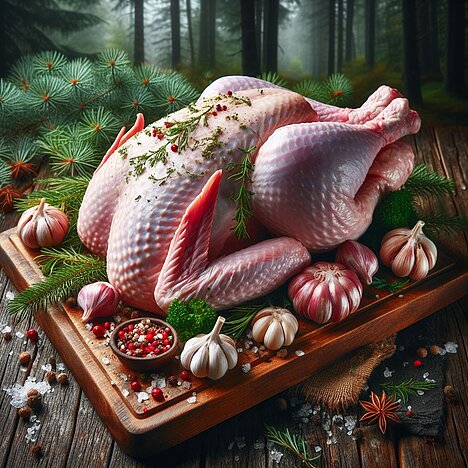Turkey meat

What is turkey meat?
Turkey meat is the meat of turkeys, which are among the largest birds in the world. There are different types of turkeys, which vary in size, color and taste. The meat can be white or dark and has a mild to spicy flavor.
Is turkey meat healthy for dogs?
Yes, turkey meat can be healthy for dogs if it is prepared and portioned correctly. Unseasoned white turkey meat without skin and bones is low in fat and high in protein. It also contains important vitamins and minerals such as vitamin B12, B6, potassium, magnesium, zinc and iron. These nutrients can strengthen the immune system, build muscle and promote blood formation.
How much turkey meat can my dog eat?
The amount of turkey meat depends on your dog's size, age and activity level. As a general rule, no more than 10% of the daily calorie intake should come from animal by-products. For a 10 kg dog, for example, this means about 30 grams of turkey meat per day.
How do I prepare turkey meat for my dog?
The simplest and safest method is to boil or steam the meat. You should avoid using any spices, as these can be harmful or incompatible for your dog. You should also remove or reduce fat. You can serve the cooked meat on its own or mix it with other ingredients such as vegetables or rice.
You can also give your dog raw turkey meat if you opt for a BARF diet. However, you should take a few precautions: Only buy fresh, high-quality meat from trustworthy sources. Store it in a cool and hygienic place. Wash your hands and all utensils thoroughly after handling raw meat. And watch your dog for any signs of infection or intolerance.
What are the risks of turkey meat for dogs?
Turkey meat can pose some risks to dogs if it is prepared incorrectly or fed excessively:
- Spices such as salt, pepper or garlic can cause gastrointestinal discomfort or even be toxic.
- Fatty meat can lead to obesity or trigger pancreatitis.
- Bones can splinter and injure the mouth or block the digestive tract.
- Raw eggs can contain salmonella.
- Hormones or antibiotics in meat can trigger allergies or impair health.
To avoid these risks, you should always pay attention:
- Only use unseasoned and lean meat
- Remove or avoid the skin and bones
- Cook or steam the meat thoroughly
- Adjust the portions to your dog's needs
- Check the origin and quality of the meat
- Have your dog checked regularly by a vet
Turkey meat can be a tasty and healthy change for your dog if you prepare and portion it correctly. It provides valuable nutrients for the health and well-being of your four-legged friend. However, be careful to avoid potential risks such as spices, fat, bones or bacteria.
If you notice any signs of hypersensitivity or poisoning in your dog, you should see your vet immediately. We are not a substitute for a vet, but we try to be as accurate as possible. Every dog reacts differently and we recommend you get a second opinion or consult your vet if in doubt.
Stay healthy and take good care of your four-legged friend!😊